Analyzing the Value of Play in Child Learning and Development
VerifiedAdded on 2023/01/12
|6
|1288
|51
Essay
AI Summary
This essay examines the significance of play in child learning and development, highlighting its crucial role in physical, cognitive, social, and emotional growth. It delves into prominent child development theories, including Freud's psychosexual theory and Piaget's cognitive development theory, linking them to the benefits of play. The essay evaluates the consensus among theorists and professionals regarding the positive impact of play on children's skills, such as teamwork, cooperation, and conflict resolution. Ultimately, it concludes that play is essential for a child's holistic development, advocating for parents to balance academic pursuits with ample opportunities for play to foster well-rounded, healthy adults. The author also shares a personal anecdote, emphasizing the importance of balancing studies and play for effective development.
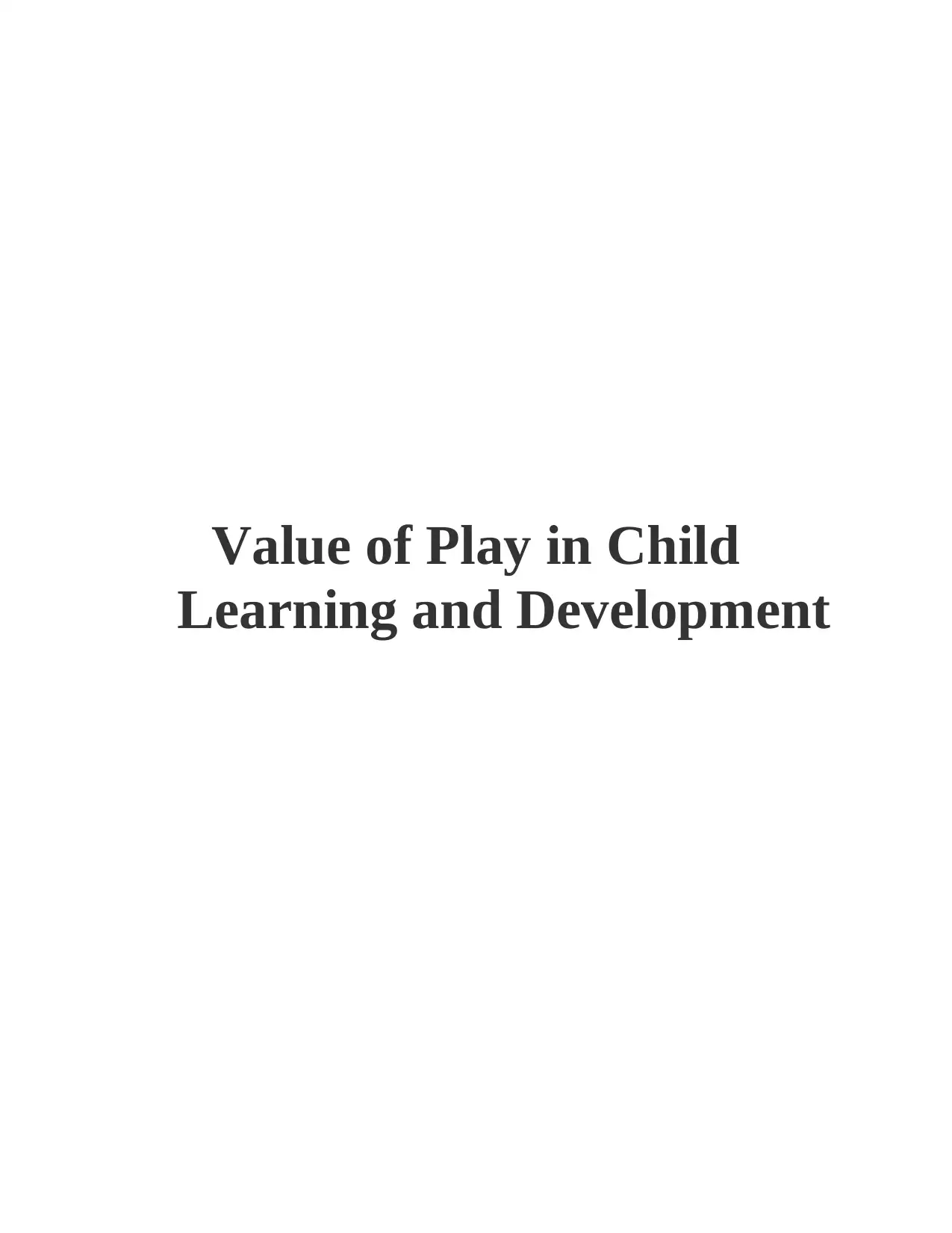
Value of Play in Child
Learning and Development
Learning and Development
Paraphrase This Document
Need a fresh take? Get an instant paraphrase of this document with our AI Paraphraser
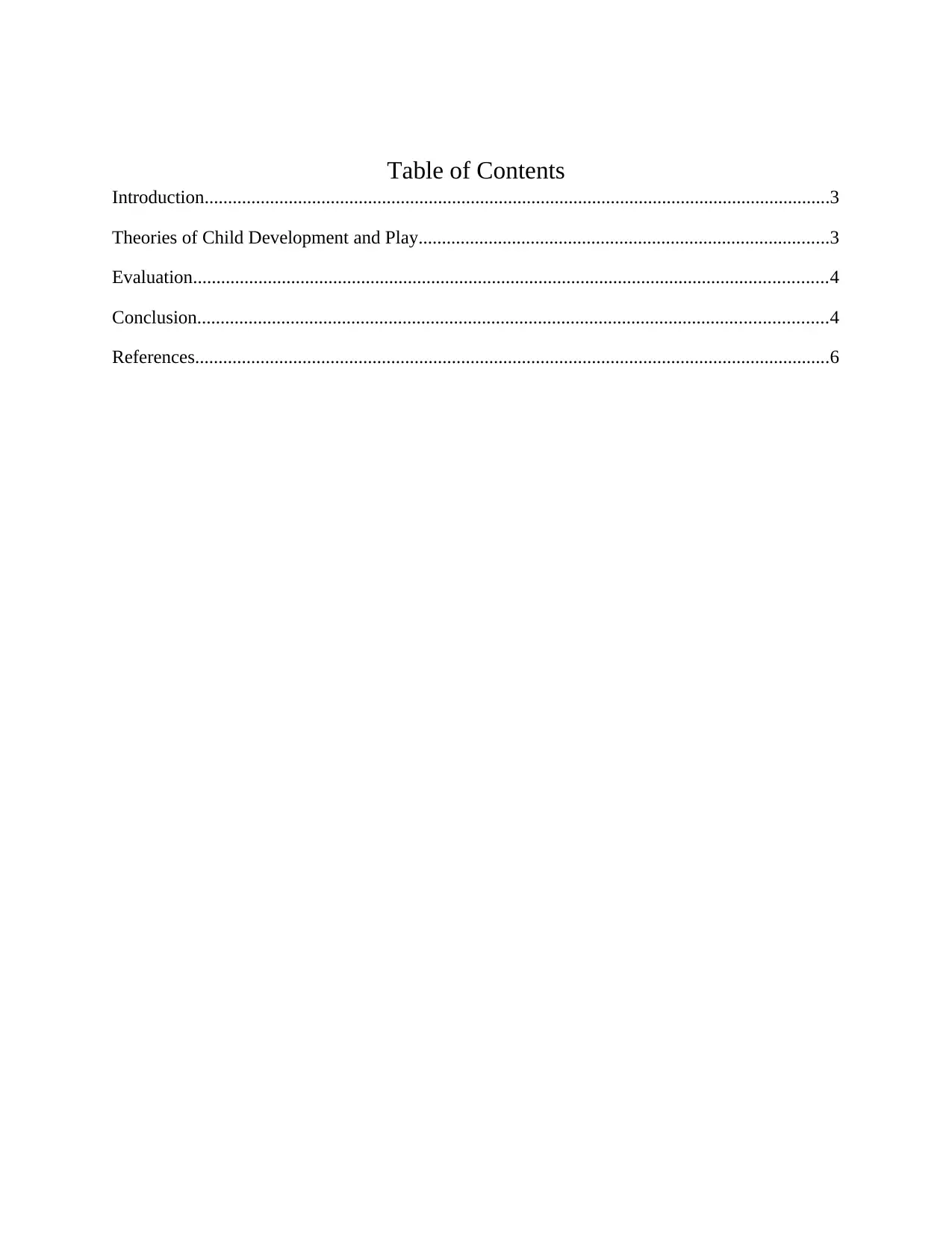
Table of Contents
Introduction......................................................................................................................................3
Theories of Child Development and Play........................................................................................3
Evaluation........................................................................................................................................4
Conclusion.......................................................................................................................................4
References........................................................................................................................................6
Introduction......................................................................................................................................3
Theories of Child Development and Play........................................................................................3
Evaluation........................................................................................................................................4
Conclusion.......................................................................................................................................4
References........................................................................................................................................6
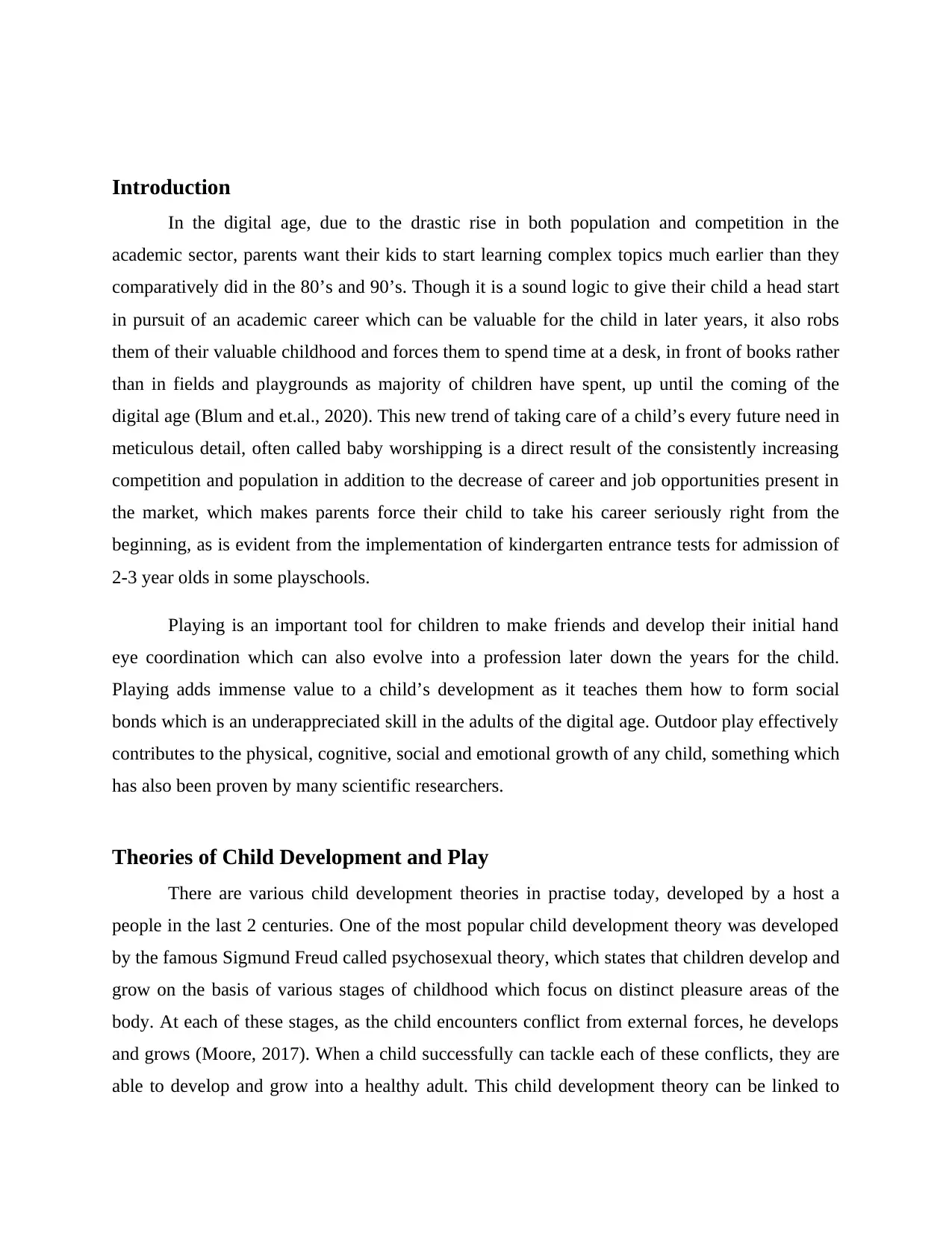
Introduction
In the digital age, due to the drastic rise in both population and competition in the
academic sector, parents want their kids to start learning complex topics much earlier than they
comparatively did in the 80’s and 90’s. Though it is a sound logic to give their child a head start
in pursuit of an academic career which can be valuable for the child in later years, it also robs
them of their valuable childhood and forces them to spend time at a desk, in front of books rather
than in fields and playgrounds as majority of children have spent, up until the coming of the
digital age (Blum and et.al., 2020). This new trend of taking care of a child’s every future need in
meticulous detail, often called baby worshipping is a direct result of the consistently increasing
competition and population in addition to the decrease of career and job opportunities present in
the market, which makes parents force their child to take his career seriously right from the
beginning, as is evident from the implementation of kindergarten entrance tests for admission of
2-3 year olds in some playschools.
Playing is an important tool for children to make friends and develop their initial hand
eye coordination which can also evolve into a profession later down the years for the child.
Playing adds immense value to a child’s development as it teaches them how to form social
bonds which is an underappreciated skill in the adults of the digital age. Outdoor play effectively
contributes to the physical, cognitive, social and emotional growth of any child, something which
has also been proven by many scientific researchers.
Theories of Child Development and Play
There are various child development theories in practise today, developed by a host a
people in the last 2 centuries. One of the most popular child development theory was developed
by the famous Sigmund Freud called psychosexual theory, which states that children develop and
grow on the basis of various stages of childhood which focus on distinct pleasure areas of the
body. At each of these stages, as the child encounters conflict from external forces, he develops
and grows (Moore, 2017). When a child successfully can tackle each of these conflicts, they are
able to develop and grow into a healthy adult. This child development theory can be linked to
In the digital age, due to the drastic rise in both population and competition in the
academic sector, parents want their kids to start learning complex topics much earlier than they
comparatively did in the 80’s and 90’s. Though it is a sound logic to give their child a head start
in pursuit of an academic career which can be valuable for the child in later years, it also robs
them of their valuable childhood and forces them to spend time at a desk, in front of books rather
than in fields and playgrounds as majority of children have spent, up until the coming of the
digital age (Blum and et.al., 2020). This new trend of taking care of a child’s every future need in
meticulous detail, often called baby worshipping is a direct result of the consistently increasing
competition and population in addition to the decrease of career and job opportunities present in
the market, which makes parents force their child to take his career seriously right from the
beginning, as is evident from the implementation of kindergarten entrance tests for admission of
2-3 year olds in some playschools.
Playing is an important tool for children to make friends and develop their initial hand
eye coordination which can also evolve into a profession later down the years for the child.
Playing adds immense value to a child’s development as it teaches them how to form social
bonds which is an underappreciated skill in the adults of the digital age. Outdoor play effectively
contributes to the physical, cognitive, social and emotional growth of any child, something which
has also been proven by many scientific researchers.
Theories of Child Development and Play
There are various child development theories in practise today, developed by a host a
people in the last 2 centuries. One of the most popular child development theory was developed
by the famous Sigmund Freud called psychosexual theory, which states that children develop and
grow on the basis of various stages of childhood which focus on distinct pleasure areas of the
body. At each of these stages, as the child encounters conflict from external forces, he develops
and grows (Moore, 2017). When a child successfully can tackle each of these conflicts, they are
able to develop and grow into a healthy adult. This child development theory can be linked to
⊘ This is a preview!⊘
Do you want full access?
Subscribe today to unlock all pages.

Trusted by 1+ million students worldwide
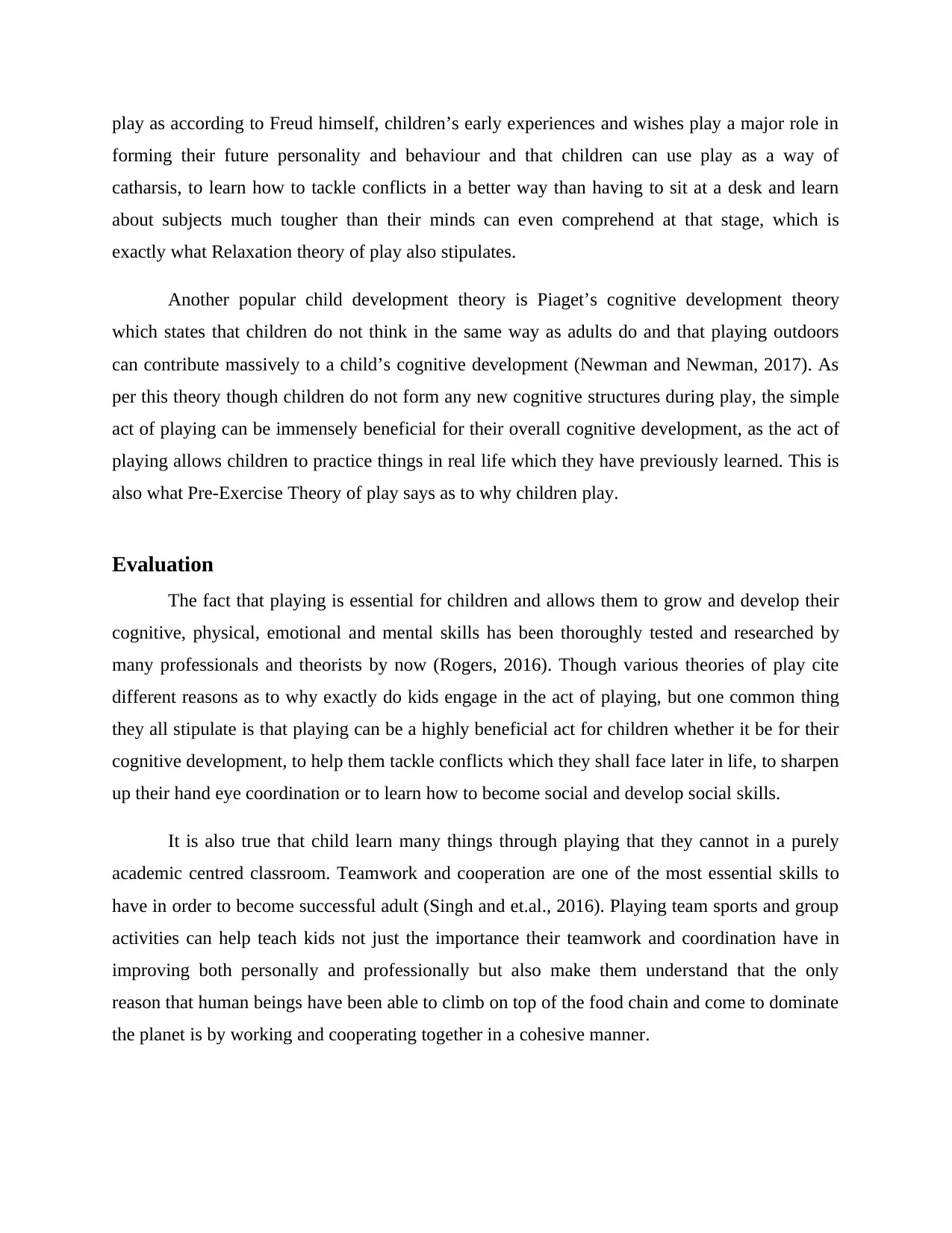
play as according to Freud himself, children’s early experiences and wishes play a major role in
forming their future personality and behaviour and that children can use play as a way of
catharsis, to learn how to tackle conflicts in a better way than having to sit at a desk and learn
about subjects much tougher than their minds can even comprehend at that stage, which is
exactly what Relaxation theory of play also stipulates.
Another popular child development theory is Piaget’s cognitive development theory
which states that children do not think in the same way as adults do and that playing outdoors
can contribute massively to a child’s cognitive development (Newman and Newman, 2017). As
per this theory though children do not form any new cognitive structures during play, the simple
act of playing can be immensely beneficial for their overall cognitive development, as the act of
playing allows children to practice things in real life which they have previously learned. This is
also what Pre-Exercise Theory of play says as to why children play.
Evaluation
The fact that playing is essential for children and allows them to grow and develop their
cognitive, physical, emotional and mental skills has been thoroughly tested and researched by
many professionals and theorists by now (Rogers, 2016). Though various theories of play cite
different reasons as to why exactly do kids engage in the act of playing, but one common thing
they all stipulate is that playing can be a highly beneficial act for children whether it be for their
cognitive development, to help them tackle conflicts which they shall face later in life, to sharpen
up their hand eye coordination or to learn how to become social and develop social skills.
It is also true that child learn many things through playing that they cannot in a purely
academic centred classroom. Teamwork and cooperation are one of the most essential skills to
have in order to become successful adult (Singh and et.al., 2016). Playing team sports and group
activities can help teach kids not just the importance their teamwork and coordination have in
improving both personally and professionally but also make them understand that the only
reason that human beings have been able to climb on top of the food chain and come to dominate
the planet is by working and cooperating together in a cohesive manner.
forming their future personality and behaviour and that children can use play as a way of
catharsis, to learn how to tackle conflicts in a better way than having to sit at a desk and learn
about subjects much tougher than their minds can even comprehend at that stage, which is
exactly what Relaxation theory of play also stipulates.
Another popular child development theory is Piaget’s cognitive development theory
which states that children do not think in the same way as adults do and that playing outdoors
can contribute massively to a child’s cognitive development (Newman and Newman, 2017). As
per this theory though children do not form any new cognitive structures during play, the simple
act of playing can be immensely beneficial for their overall cognitive development, as the act of
playing allows children to practice things in real life which they have previously learned. This is
also what Pre-Exercise Theory of play says as to why children play.
Evaluation
The fact that playing is essential for children and allows them to grow and develop their
cognitive, physical, emotional and mental skills has been thoroughly tested and researched by
many professionals and theorists by now (Rogers, 2016). Though various theories of play cite
different reasons as to why exactly do kids engage in the act of playing, but one common thing
they all stipulate is that playing can be a highly beneficial act for children whether it be for their
cognitive development, to help them tackle conflicts which they shall face later in life, to sharpen
up their hand eye coordination or to learn how to become social and develop social skills.
It is also true that child learn many things through playing that they cannot in a purely
academic centred classroom. Teamwork and cooperation are one of the most essential skills to
have in order to become successful adult (Singh and et.al., 2016). Playing team sports and group
activities can help teach kids not just the importance their teamwork and coordination have in
improving both personally and professionally but also make them understand that the only
reason that human beings have been able to climb on top of the food chain and come to dominate
the planet is by working and cooperating together in a cohesive manner.
Paraphrase This Document
Need a fresh take? Get an instant paraphrase of this document with our AI Paraphraser
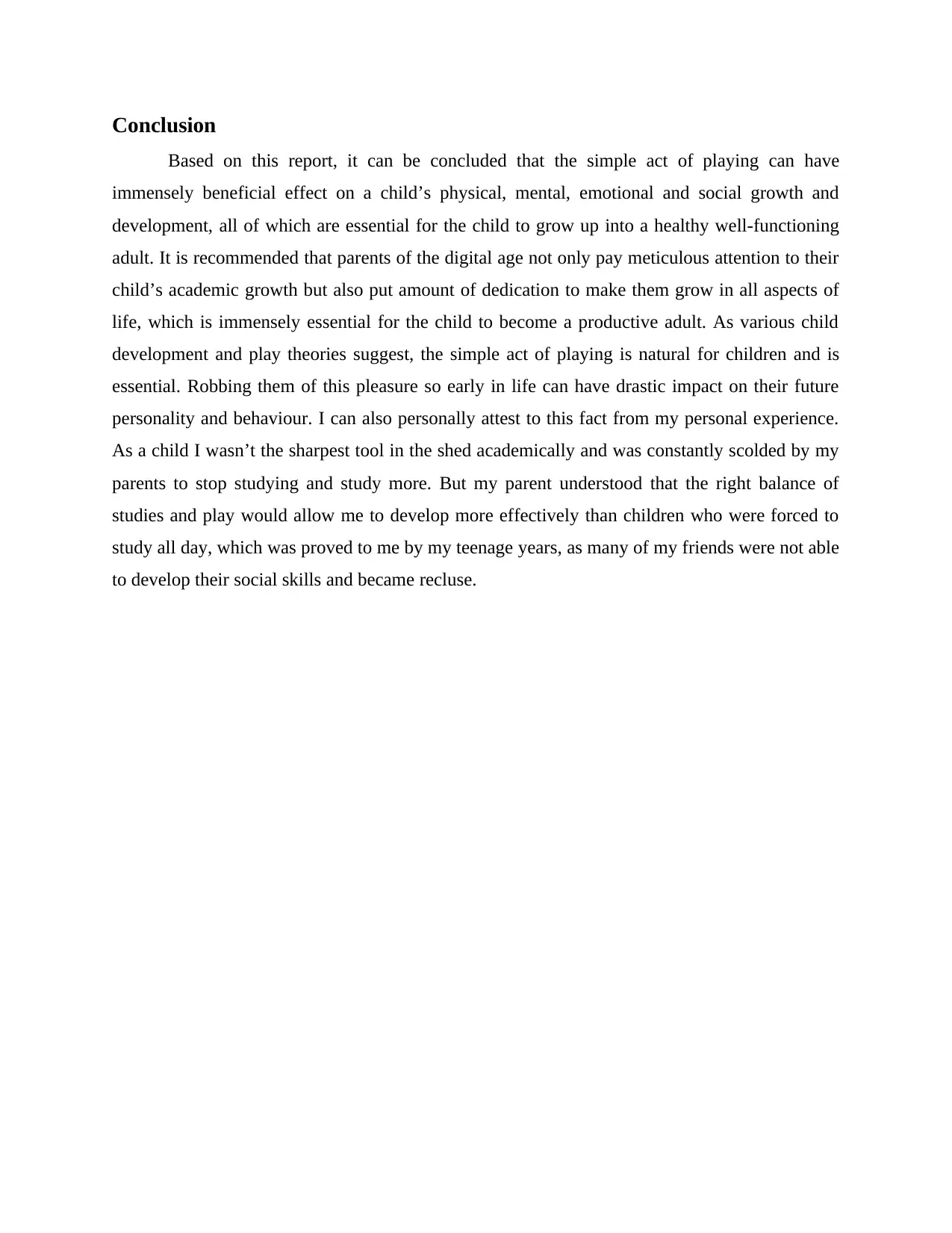
Conclusion
Based on this report, it can be concluded that the simple act of playing can have
immensely beneficial effect on a child’s physical, mental, emotional and social growth and
development, all of which are essential for the child to grow up into a healthy well-functioning
adult. It is recommended that parents of the digital age not only pay meticulous attention to their
child’s academic growth but also put amount of dedication to make them grow in all aspects of
life, which is immensely essential for the child to become a productive adult. As various child
development and play theories suggest, the simple act of playing is natural for children and is
essential. Robbing them of this pleasure so early in life can have drastic impact on their future
personality and behaviour. I can also personally attest to this fact from my personal experience.
As a child I wasn’t the sharpest tool in the shed academically and was constantly scolded by my
parents to stop studying and study more. But my parent understood that the right balance of
studies and play would allow me to develop more effectively than children who were forced to
study all day, which was proved to me by my teenage years, as many of my friends were not able
to develop their social skills and became recluse.
Based on this report, it can be concluded that the simple act of playing can have
immensely beneficial effect on a child’s physical, mental, emotional and social growth and
development, all of which are essential for the child to grow up into a healthy well-functioning
adult. It is recommended that parents of the digital age not only pay meticulous attention to their
child’s academic growth but also put amount of dedication to make them grow in all aspects of
life, which is immensely essential for the child to become a productive adult. As various child
development and play theories suggest, the simple act of playing is natural for children and is
essential. Robbing them of this pleasure so early in life can have drastic impact on their future
personality and behaviour. I can also personally attest to this fact from my personal experience.
As a child I wasn’t the sharpest tool in the shed academically and was constantly scolded by my
parents to stop studying and study more. But my parent understood that the right balance of
studies and play would allow me to develop more effectively than children who were forced to
study all day, which was proved to me by my teenage years, as many of my friends were not able
to develop their social skills and became recluse.
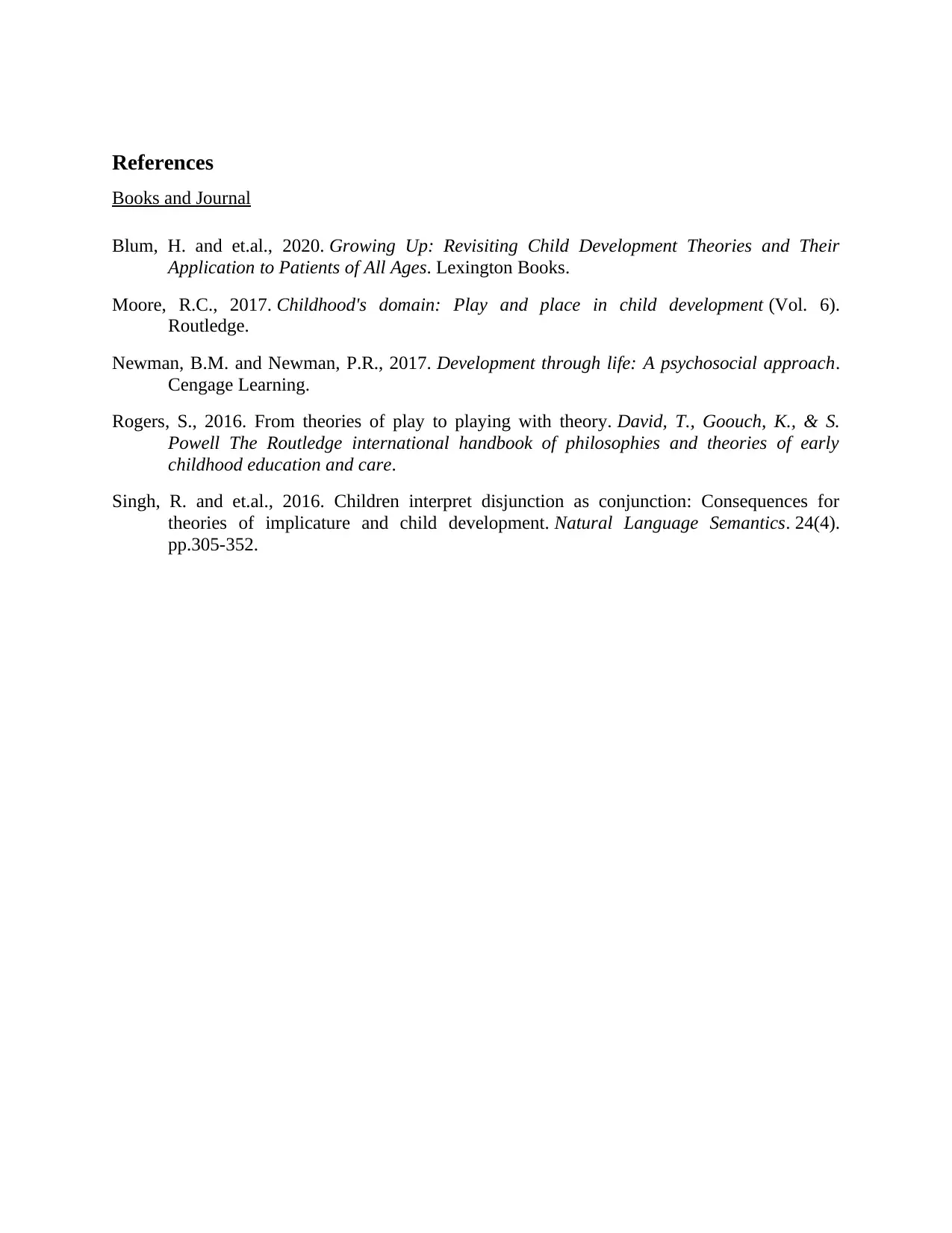
References
Books and Journal
Blum, H. and et.al., 2020. Growing Up: Revisiting Child Development Theories and Their
Application to Patients of All Ages. Lexington Books.
Moore, R.C., 2017. Childhood's domain: Play and place in child development (Vol. 6).
Routledge.
Newman, B.M. and Newman, P.R., 2017. Development through life: A psychosocial approach.
Cengage Learning.
Rogers, S., 2016. From theories of play to playing with theory. David, T., Goouch, K., & S.
Powell The Routledge international handbook of philosophies and theories of early
childhood education and care.
Singh, R. and et.al., 2016. Children interpret disjunction as conjunction: Consequences for
theories of implicature and child development. Natural Language Semantics. 24(4).
pp.305-352.
Books and Journal
Blum, H. and et.al., 2020. Growing Up: Revisiting Child Development Theories and Their
Application to Patients of All Ages. Lexington Books.
Moore, R.C., 2017. Childhood's domain: Play and place in child development (Vol. 6).
Routledge.
Newman, B.M. and Newman, P.R., 2017. Development through life: A psychosocial approach.
Cengage Learning.
Rogers, S., 2016. From theories of play to playing with theory. David, T., Goouch, K., & S.
Powell The Routledge international handbook of philosophies and theories of early
childhood education and care.
Singh, R. and et.al., 2016. Children interpret disjunction as conjunction: Consequences for
theories of implicature and child development. Natural Language Semantics. 24(4).
pp.305-352.
⊘ This is a preview!⊘
Do you want full access?
Subscribe today to unlock all pages.

Trusted by 1+ million students worldwide
1 out of 6
Related Documents
Your All-in-One AI-Powered Toolkit for Academic Success.
+13062052269
info@desklib.com
Available 24*7 on WhatsApp / Email
![[object Object]](/_next/static/media/star-bottom.7253800d.svg)
Unlock your academic potential
Copyright © 2020–2026 A2Z Services. All Rights Reserved. Developed and managed by ZUCOL.





